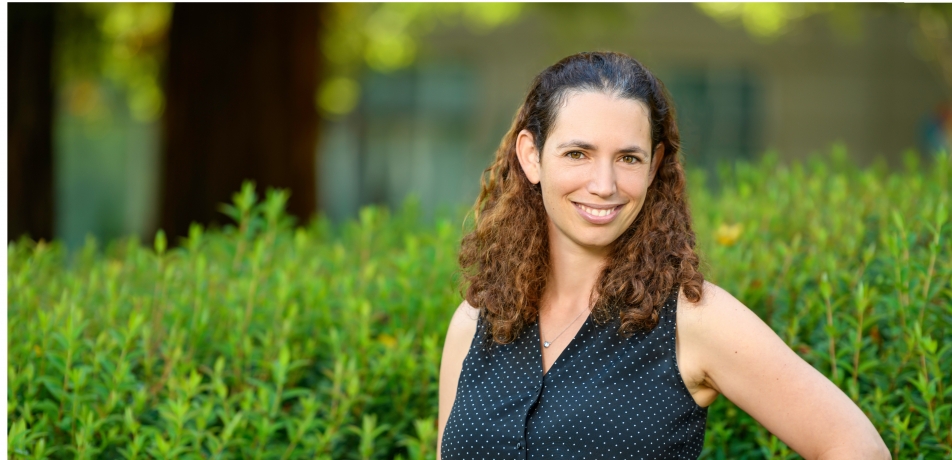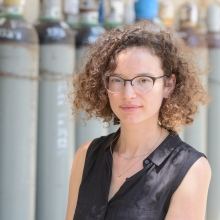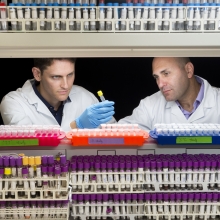Exploring cancer's environment
New scientists

Dr. Leeat Keren
Cancer cells and the healthy cells that surround them have a complex relationship. The healthy cells can act to either suppress or support the growth of tumors, and sometimes do both. At the heart of this interplay is the immune system. It is becoming increasingly clear that for some cancers, the most effective treatment may not involve targeting the tumor itself, but rather harnessing the patient’s own immune system to fight the tumor.
Scientists are just beginning to unravel the interplay between the individual cells of a tumor, the ‘normal’ stromal cells that surround them (their microenvironment), and the immune system. At different times the immune system can attack growing tumors, or be fooled into ignoring them, allowing healthy cells to provide a supportive environment for the tumor.
Surveilling tumors
The immune system plays a major role in the surveillance against tumors. In response, tumors develop various strategies to escape attack. Dr. Keren is working to explore the full extent of the mechanisms that tumor cells use to take over their microenvironment and avoid the immune system’s scrutiny.
She began her explorations as a PhD student in systems biology at the Weizmann Institute. Interested in the degree to which the amount of protein produced by a given cell reflects its overall health and function, she developed high-throughput genetic engineering techniques to manipulate and measure the activity levels of many different proteins within thousands of cells at a time, precisely controlling the amounts of each particular protein. This work provided new insights into cellular development, survival, and activity in various diseases, such as cancer.
Then, as a postdoctoral fellow at Stanford University, she worked on the development of a new form of imaging technology combined with mass spectrometry—multiplexed-ion-beam imaging by time-of-flight (MIBI-TOF).
The MIBI-TOF platform allows scientists to view the precise amount and location of dozens of different proteins at work in each cell in clinical specimens. She used MIBI-TOF to investigate the tumor microenvironment in triple-negative breast cancer, an aggressive, invasive form of the disease that responds well to immunotherapy, but only in a subset of patients. Dr. Keren identified patterns of tumor-immune interactions along the tumor border that are predictive of survival.
She plans to combine the powers of multiplexed imaging and single-cell genetic sequencing technologies with computational biology and clinical collaborations to gain further insights into tumor-immune interactions. She aims to achieve a better understanding of the complex relationships between tumors, their microenvironment, and the immune system, with an eye towards the development of personalized diagnostics and cancer treatments.
Dr. Keren completed her BSc magna cum laude in life sciences at Tel Aviv University in 2008, after serving in the intelligence unit of the Israel Defense Forces as a first lieutenant. She completed an MSc at the Weizmann Institute of Science with Prof. Eran Segal in 2010, and went on to complete a PhD in both computer science and molecular cell biology in 2016, working jointly under Prof. Segal and Prof. Ron Milo in the Department of Plant and Environmental Sciences. She conducted her postdoctoral research in the Department of Pathology at the Stanford University School of Medicine in Palo Alto, California. She will join the faculty of the Weizmann Institute in January 2020.
Since graduating as a Dean’s list scholar and Wolf Prize winner from Tel Aviv University, Dr. Keren won the Dean’s Prize for outstanding MSc students at the Weizmann Institute, and the Azrieli Center for Systems Biology prize for student-initiated project. She was a Clore Fellow in the Israel National Postdoctoral Award Program for Advancing Women in Science, received Rothschild and Fulbright postdoctoral fellowships in 2016, and a Damon Runyon postdoctoral fellowship in 2017. Dr. Keren is married and has three boys.
Dr. Keren is supported by the Clore Israel Foundation.








